Innovative digital solutions
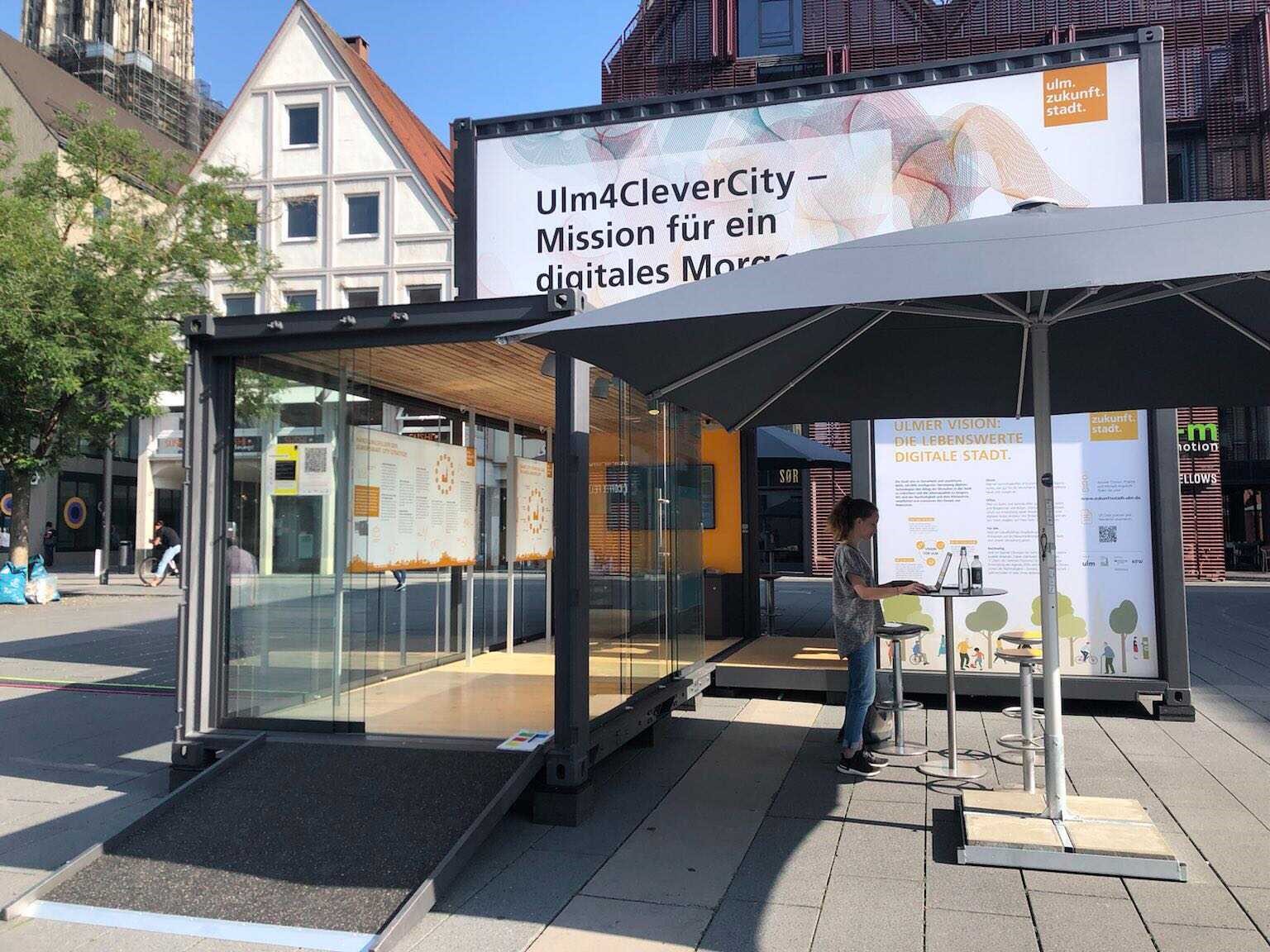
© DigitaleAenda/CC0
We want to proactively shape the change that is taking place in Ulm as a result of digitalisation, with the involvement of the city's society. This means that we incorporate the knowledge and wishes of the people of Ulm into our projects. Our goal is to make digitalisation smart, open, sustainable and for everyone. Ulm should remain a liveable city and an attractive business location in competition with others in the long term.
The Digital Agenda Office of the City of Ulm provides impetus to the city's society, administration and economy. There are already a number of projects on the way to the Smart City Ulm. Here is an overview.
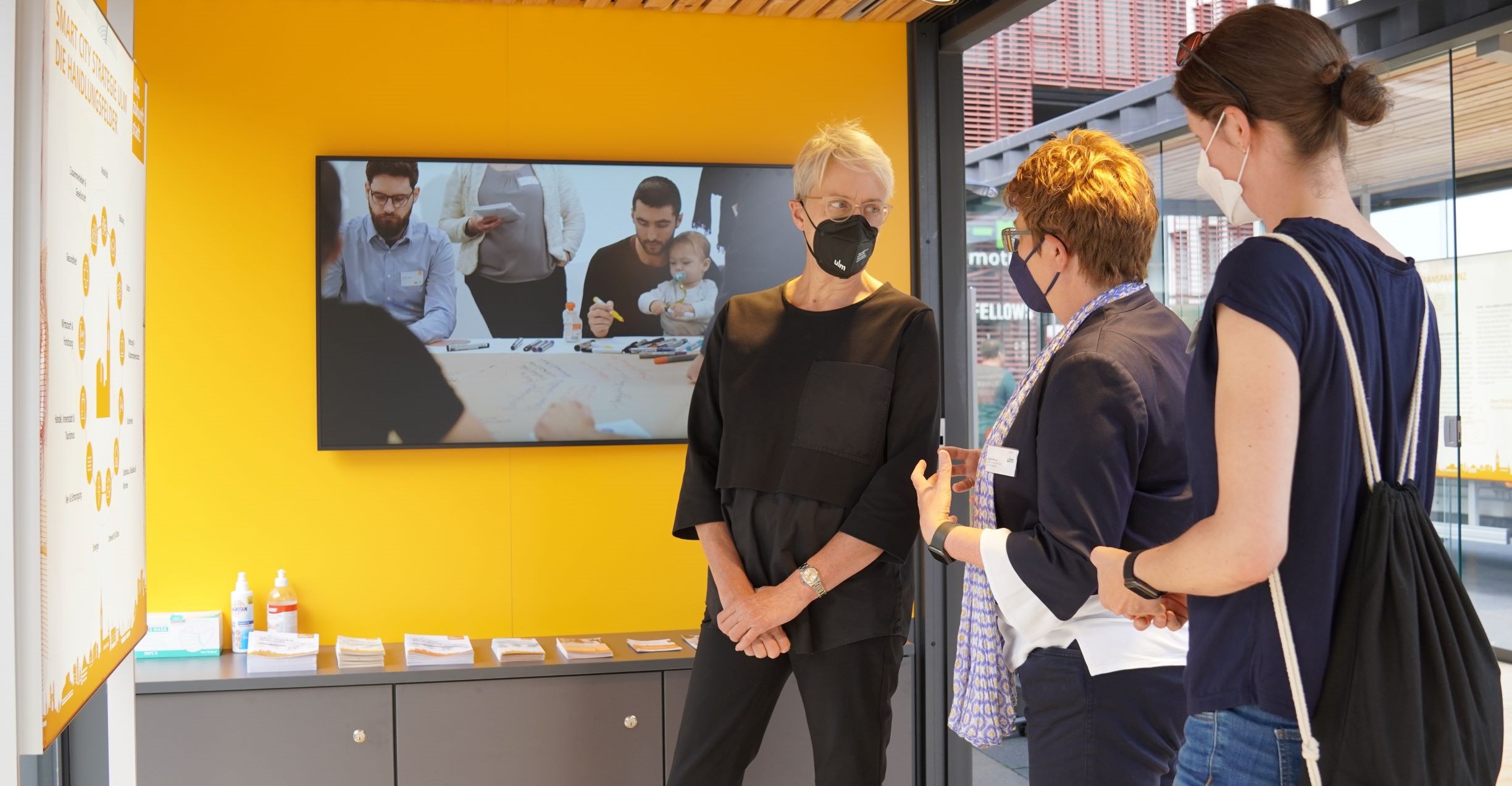
© StadtUlm/DigitaleAgenda/CC0
Citizen Participation Platform | zukunftsstadt-ulm.de
Ulm stands in a more than 600-year-old history of citizen participation and engagement; consequently, citizen participation is a main pillar of Ulm's path towards a digital, smart and sustainable city. In addition to several on site formats, Ulm launched its own participation platform: https://www.zukunftsstadt-ulm.de/. On this platform, every citizen can create a personal account and contribute to ongoing debates concerning everything from humdrum problems to strategic challenges for the residents of the city. Moreover, citizens can find details and background information on current projects and initiatives, as well as all summaries and important documents on past projects and decisions. The platform produced a number of useful outcomes already, from specific measures for a more sustainable quarter at Eselsberg to concepts and ideas for the horticultural show in 2030.
Do you want to participate digitally in current discourses of the city of Ulm? In addition to the classic forms of citizen* participation, the city also offers online formats such as surveys, consultations/idea competitions and an interactive map. In this way, citizens are involved in the preparatory processes at an early stage and without major hurdles. Suggestions and ideas from citizens can be used to support planning and decision-making. An overview of current participation projects and documentation of past participation processes can be found here. (German)
Started: 07/2016 | running | Contact: digitale-agenda@ulm.de | Funding: City of Ulm
Intercultural Communication Space - ICS
The Intercultural Communication Space is designed to help overcome language barriers and enable multilingual communication. Therefore, a translation software and a (spatial) environment for it will be set up at the Museum Ulm. People can meet here and speak to each other in different languages. After activating the system and selecting the languages, the spoken word is recognized by a microphone, directly translated into the desired language, and transmitted via speaker.
The goal of the Intercultural Communication Space is to promote encounters and exchange between people with different linguistic and cultural backgrounds and to strengthen togetherness in Ulm's urban society. The offer will be available from December 9 on free of charge and independent of an exhibition visit at the Museum Ulm. The ICS can be reserved in advance or used spontaneously if not yet occupied.
Started 03/2021 | Ended 11/2021 | Contact: Raffael Rogger | Funding: Ulm4CleverCity
Der Boxenstopp
The pit stop - the translation for Boxenstopp - is over, the mission for a digital tomorrow continues. In the middle of the city, there was a free space for three weeks where citizens and administration could learn, discuss, and collaborate on urban development and digitalization, resulting in specific solutions which will now be implemented. As part of the Ulm city administration, the Digital Agenda office is shaping digital development together with the people of Ulm - the pit stop was another chapter on this path. Challenges for a digital tomorrow - 10 days of long discussions with interested citizens. The results converged into so-called "personas". These invented model persons are supposed to give the respective challenge a face and a story and make it easy to develop solutions that focus on the users of the solution.
In the first phase of Urban Design Thinking as part of the "Pit Stop Mission for a Digital Tomorrow", many conversations were held with citizens over a period of 10 days in order to better understand the different needs and to get a feel for how individual problems are concretely reflected in people's everyday lives. At the same time, there was always the possibility to mark individual places on a map that have a special relation to the respective challenge. After 10 days of needs assessment, the results have been structured. Find out more.
Started: 07/2021 | Ended: 08/2021 | Contact: Nadja Wenger | Funding: Ulm4CleverCity
Citizen Lab - Das Verschwörhaus
"Das Verschwörhaus" is a beacon project throughout Germany for net-cultural programs and discourses to firmly and sustainably anchor the "City of the Future 2030" in the citizenry. Within walking distance of the city centre, a space has been created to playfully acquire and teach digital literacy in an "experimental field for the world of tomorrow". This means not only being able to use computers, smartphones and tablets as mere consumers, but also to understand their technical functionality and the social and ethical dimensions associated with them. In this context, "playful" means above all independent experimentation and creative do-it-yourself activities, in order to awaken the play instinct and the self-determined desire to learn in the truest sense of the word. Neither academic instruction nor the exaltation of economic usability as the goal of all action come close to this free play. The citizens thus become active co-creators of the city of the future, who become active out of their own personal needs and drives. They thus have a personal motive and motivation not only to initiate innovative projects, but also to develop and sustain them.
The Verschwörhaus is also a field of experimentation for extracurricular educational offerings, as a source of inspiration for teaching digital skills. However, this does not involve the classic promotion of elites. Rather, the focus is on a broad impact in order to reach the entire breadth of society and, in particular, to address and promote those groups that have been underrepresented or marginalized in the digitalization discourse to date. In this way, even those voices are heard that have so far found it difficult to gain access to the digitization debate or whose problems and wishes cannot be marketed as a product.
Opened: 07/2016 | Contact: digitale-agenda@ulm.de | Funding: City of Ulm
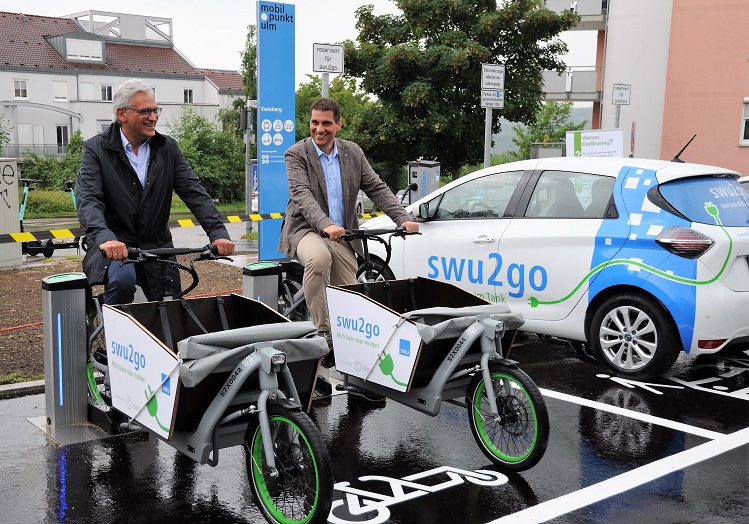
© ZK/CC0
Air quality and climate data Eselsberg | ulm.svc.hawadawa.com
Has the climate changed measurably on site? With LoRaWan-capable sensors we lay the foundation for first own urban measurement series and evaluations at Eselsberg. Sensors will be used to measure the air quality in, among other places, allotment gardens and in built-up areas along streets in the neighbourhood, in order to gain a better understanding of the relationship between climate and traffic pollution and to develop suitable measures for future control concepts. Basic environmental parameters are measured and published in real time for evaluation by research and scientific institutes. In this way, environmental data could be directly incorporated into everyday life and urban planning in a controlling manner, also with the help of experts. The measurement data will be fed via interface (API) into the Ulm data platform (datenhub.ulm.de). The climate-data-website also shows citizens the measurement data in an easy-to-understand way. Sensors measure: Ozone, nitrogen dioxide particulate matter, temperature and humidity.
Benefits: The sensors as well as their compilation via the urban LoRaWAN help to better understand local dependencies and correlations on climate data and air quality at Eselsberg. Observers can see whether and which parameters influence local air quality - and whether they can be controlled.
Meanwhile, the city administration and its partners are building knowledge about sensors and air/climate data interpretation. In the long term, this knowledge can be used to optimize urban planning in a sustainable way.
Started: 12/2019 | Ends: 12/2021 | Contact: Kai Weinmüller | Funding: Zukunftskommune
Mobility Hub
In the Eselsberg neighbourhood of Ulm, one car is registered for every two residents over the age of 18, on average. Parked cars dominate the streets. As a pilot project, we have set up a first mobility hub at Eselsberg, where citizens can use and try out sharing offers of (e-)cars and e-bikes. The hub functions as a test lab for citizens to find out what sharing and mobility means for them personally, and whether and when they could and would realistically do without individually owned vehicles. By building this mobility hub, the city of Ulm was able to develop and test design specifications and other framework conditions for other mobility stations in Ulm. For the conception, construction and planning of further mobility hubs as well as the provision of sharing offers in Ulm, the administration can learn from the prototype and derive conclusions. Further hubs are already planned, for example at the central train station.
The mobility hub provides incentives to question one's own attitude to mobility, offers a further public e-charging infrastructure for the Eselsberg neighbourhood and tests a first publicly usable e-bike sharing service in Ulm. The mobility hub thus makes it tangible for citizens how sharing offers affect their own lives and behaviour. In addition, for the first time, all mobility providers were obligated to provide the city with availability data (also for car sharing cars, e-load bikes and the e-charging station) in a standardized manner; this is an important step on Ulm's path toward open data.
Started: 12/2019 | Ends: 12/2021 | Contact: Lucia Erdt | Funding: zukunftskommune@BW
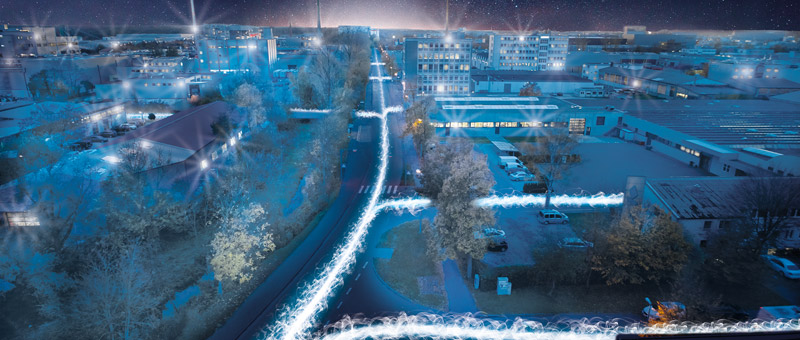
© SWU
Data ethics concept
Increasing digitization and intelligent networking are changing cities and society. In this respect, it is also important to consider regulations on the ethical handling of the data collected. Therefore, on October 08, 2020, the Ulm City Council adopted a municipal data ethics concept. We are aware that a data ethics concept alone is no guarantee for acting in the public interest and for including and protecting vulnerable groups. It can only serve as a guideline and principle for further handling and requires constant reflection by all those involved and their goals. Digital technologies have the potential to make the municipal provision of administrative services more efficient and citizen-oriented. However, it should be noted that technology is not an end in itself, but a means to the end of performing public tasks.
The data ethics concept establishes ethical guidelines for the design, programming, operation, and use of data, applications, and IT systems by the city of Ulm. The concept sets ethical principles and value commitments of the city administration of Ulm for the handling of municipal data. This is important in order to achieve the goal of using digitization in a usable manner to strengthen the common good and to prevent negative excesses through ethical guidelines. At the centre of the understanding are the people of Ulm, lived citizen orientation, and the generation of benefit for the city, region, and society.
Adopted 10/2020
Data Hub
Datenhub.ulm.de is a platform offering free and open data by and about the city of Ulm. In the medium term, Datenhub.ulm.de shall become the central entry point for searching for open data and sensor data in Ulm. Since the end of 2020, we will start to make the first data from the city administration available here for anyone who is looking for data, wants to make simple visualizations, and wants to further process and use it in accordance with the license conditions specified in the metadata. License conditions or whether data or services from third-party systems are provided is documented in the data descriptions (metadata). In the expansion stage, the data hub will also enable municipal companies, business, research and citizens to offer and further use data via a central entry point. The data descriptions (metadata) are based on DCAT-AP.de standards for metadata.This data platform was developed and set up as part of the state funding project Zukunftskommune@bw under the leadership of the Digital Agenda office of the city of Ulm.
Some technical information: Several open source components are used for this platform. The platform architecture (diagram) illustrates these graphically. All software components under open license from Datenhub.ulm.de illustrates this graphically. All software components under open license of Datenhub.ulm.de are published under CC-0 license and available in the Github public repository for reuse or further implementation by others.
Started: 3/2019 | Ends: 12/2021 | Contact: Lucia Erdt | Funding: zukunftskommune@bw
LoRaPark - the show garden for the Internet of Things (IoT)
The voluntary Ulm TTN community and the entrepreneurial initiative (initiative.ulm.digital) have built and still operate a LoRaWAN in Ulm based on The Things Network. It is a network for the Internet of Things, accessible for all interested citizens and companies, thus IoT becomes tangible for everyone. In the city of Ulm uses Wirnet Stations from Kerlink to provide the basic LoRaWAN infrastructure. 17 of these gateways are installed in exposed positions across the cities of Ulm and Neu-Ulm. As an example, one gateway was installed on the tower of the Ulm Minster, the tallest church in the world with a spire height of 161.5 metres.
After the infrastructure had been installed in 2019, the city established the so-called LoRaPark. The show garden helps to bring citizens and companies in touch with the LoRaWAn and IoT technology, demonstrate possible use cases and trigger citizens and companies to integrate the IoT in their business and daily life. The park opened in July 2020 as result of an innovation competition announced by the city of Ulm, won by citysens GmbH. The LoRaPark is located inside Ulm’s historic centre, at the Weinhof. Many citizens and tourists pass the area in which more than 15 different sensor-based use cases are presented and their potential for application in daily life is explained in a vivid manner.
The sensors track a wide range of events and developments, including environmental emission, water level and temperature, soil humidity, rat population, availability of parking space, tourist flows, bikepath frequency, and fill level of containers. With these sensors alone, the city could optimize multiple processes from irrigation over waste disposal to tourist management or strategic urban planning. All sensors are mounted in public space in an area of around 1 square kilometer with information signs explaining their functions. A large information display at the entrance to the Weinhof (Sattlergasse) provides information about the sensors and their data. Further information on the complete project and data on the sensors can be found at lorapark.de
Started 07/2020 | running | Contact: digitale-agenda@ulm.de | Funding: City of Ulm
Ulm Connected - Broadband coverage for citizens in Ulm
The expansion of the fibre-optic and mobile communications network is being continuously extended in Ulm. Ulm is already very close to the European Commission's goal of being able to offer all households in the European Union a broadband connection with transmission rates of at least 100 megabits/second by 2025, which can be expanded to 1 gigabit/second if desired. Here (German) you will find an overview of the current broadband coverage within the city of Ulm. Data are updated regularly.
Lord Mayor Gunter Czisch emphasizes that the comprehensive expansion of the fibre optic network is a key challenge for the development of Ulm and Neu-Ulm into smart cities. In addition to the classic supply tasks of a city, such as electricity, gas, water or roads, the development of a sustainable high-speed infrastructure is also and especially part of this in order to be prepared for the increasing digitization of working and living environments in the smart cities of Ulm and Neu-Ulm. Stadtwerke Ulm is investing a total of 30 million euros in the construction of high-speed communications lines by 2024. Beyond the fibre optic infrastructure, the city installed and regularly extends public WiFi as well as the LoRaWAN.
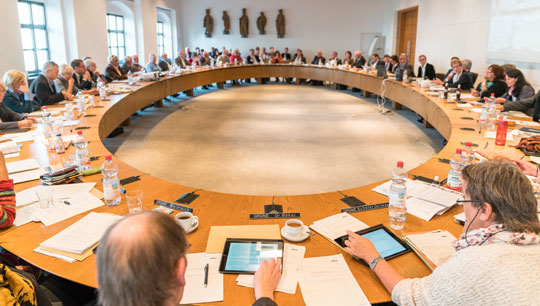
© Stadt Ulm
Digital Mentors
Sending a photo via smartphone, staying in touch with family via video conference or participating in an event online - what has long been part of the increasingly digital everyday life for many, poses major challenges for others. To ensure that everyone is taken along on the path to the digital world and can actively participate in it, there are digital mentors in Ulm. Here, people volunteer to answer other people's questions about smartphones, tablets, video conferencing and digitization in everyday life and to help them participate.
Digital mentors receive further training as part of a pedagogical and didactic course. After this, their commitment not only supports digital education and overcoming the digital divide, but they also actively contribute to improved intergenerational coexistence at neighbourhood level. In this way, digital potential is better exploited and social cohesion is sustainably strengthened.
The Digital Mentors project was created as part of the City of the Future 2030 project and has been offered regularly in Ulm since summer 2021.
Started: 03/2021 | running | Contact: Sabrina Richter / digitale-agenda@ulm.de | Funding: Zukunftsstadt 2030
E-Government
The city of Ulm offers a wide range of digital administrative services that can significantly reduce the workload for citizens. In addition, the city provides online services that enable citizens to handle important services quickly from home or on the go, as well as citizen participation in important city issues. Citizen information systems make the activities of the city administration transparent, and digital media allow citizens to find out about the latest news from the city of Ulm. The services can be found here (in German)
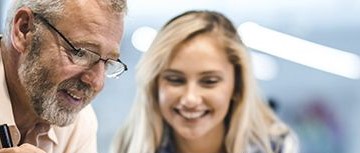
© DA
Ambient Assisted Living (AAL) Showroom
Many people would like to be able to live at home longer in old age, even if everyday life becomes more difficult or relatives are concerned about safety and well-being. Often, the everyday life of those affected is then determined by the rhythm of third parties on whose help they depend, or a move to assisted living or a home is even on the cards.
Digital and technical everyday helpers, so-called Ambient Assisted Living (AAL), can offer help and a solution here, so that people can remain self-determined and mobile at home in their familiar surroundings for longer.
With Ambient Assisted Living, the home and its furnishings support the residents and offer more than a SmartHome. Age-appropriate assistance systems are intended to increase the self-determination of life at home (in old age). This includes user-centered methods, concepts and, above all, electronic systems and sensors. These enable, for example, voice control of objects and systems in the home, adjustments to habits, as well as protective measures such as smoke detectors, automatic shutdown of the stove, or alarm functions in the event of falls or health emergencies. In addition, it offers an enhanced possibility for communication and social interaction.
Started: 09/2020 | running | Contact: digitale-agenda@ulm.de | Funding: Zukunftsstadt 2030
Kreativraum - a space for creation and creativity
The digitization of public administration is currently a central topic. Through numerous projects, Ulm has become one of the pioneering cities in digital transformation. Now, innovative ideas for digitization should also be able to be discussed and concretized within Ulm's city administrations. "The newly created administration lab provides the right framework for this. It promotes interdisciplinary exchange within the city administration and creates scope for new ideas for the administration of tomorrow," emphasizes First Mayor Martin Bendel. Projects in the creative space are to be approached pragmatically according to the motto: "Just do it! It could turn out well!"
The creative space in Weinhof 7 is the real place and central core of the administration laboratory, which is open to all departments and facilities of the city administration as a space for cooperation, exchange and impulses from external experts.
Started 05/2020 | running | Contact: Sabrina Richter | Funding: Zukunftsstadt 2030

